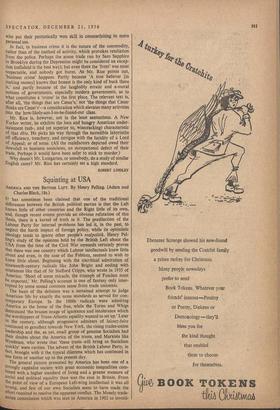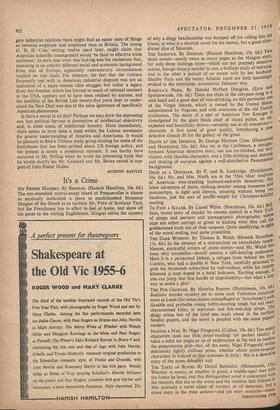Squinting at USA
AMERICA AND THE BRITISH LEFT. By Henry Pelling. (Adam and Charles Black, 18s.)
IT has sometimes been claimed that one of the traditional differences between the British political parties is that the Left knows little of other countries and the Right little of its own, and, though recent events provide an obvious refutation of this thesis, there is a kernel of truth in it. The predilection of the Labour Party for internal problems has led it, in the past, to neglect the harsh impact of foreign policy, while its optimistic Ideology tends to ignore other people's realpolitik. Henry Pel- ling's study of the opinions held by the British Left about the USA from the time of the Civil War onwards certainly proves that there was one country which Labour intellectuals knew little about and even, in the case of the Fabians, seemed to wish to know little about. Beginning with the uncritical admiration of nineteenth-century radicals like John Bright and ending with utterances like that of Sir Stafford Cripps, who wrote in 1935 of America: 'Short of some miracle, the triumph of Fascism must be expected.' Mr. Pelling's account is one of fantasy only inter- rupted by some sound common sense from trade unionists. The basis of the delusion was a sustained attempt to judge American life by exactly the same standards as served for con- temporary Europe. In the 1860s radicals were admiring America as the home of the free, while the Tories and Whigs denounced 'the brazen image of ignorance and intolerance which the worshippers of Trans-Atlantic equality wanted to set up.' Later In the century, although progressive admirers of laissez-faire Continued to genuflect towards New York, the rising trades-union leadership and the, as yet, small group of genuine Socialists had their doubts about the America of the trusts, and Marxists like HYndman, who wrote that 'these trusts will bring us Socialism quickly' were rarities. The advent of the British Labour Party, in fact, brought with it the typical dilemma which has continued in one form or another up to the present day.
The general picture presented by America has been one of a strongly capitalist society with great economic inequalities com- bined with a higher standard of living and a greater measure of social and political equality than was the case in Britain. From the point of view of a European Left-wing intellectual it was all wrong, and few of our own Socialists seem to have made the effort required to resolve the apparent conflict. The Mosely trade- union commission which was sent to America in 1902 to investi- gate industrial relations there might find an easier state of things as between employer and employed than in Britain. The young G. D. H. Cole, writing twelve years later, might claim that American scientific management would 'be fatal to effective trade unionism.' In each case what was lacking was the realisation that, operating in an entirely different social and economic background from that of Europe, apparently contradictory circumstances implied no real clash. For instance, the fact that the violence frequently met with in American industrial disputes was not an indication of a more intense class struggle, but rather a legacy from that frontier, which has formed so much of national manners in the USA, appears not to have been realised by anyone, and the inability of the British Left twenty-five years later to under- stand the New Deal was due to the same ignorance of specifically American phenomena.
Is there a moral in all this? Perhaps we may draw the depressing one that political fervour is destructive of intellectual objectivity and, in some cases, of intellectual honesty. More immediately, there seems to have been a need within the Labour movement for greater understanding of America and Americans. It would be pleasant to find a Tribune study group atoning for some of the foolishness that has been printed about US foreign policy, and the present is surely a propitious moment. It can hardly have occurred to Mr. Pelting when he wrote his interesting book that he would shortly see Mr. Gaitskell and Mr. Bevan united in sup- port of John Foster Dulles.
ANTHONY HARTLEY



































 Previous page
Previous page